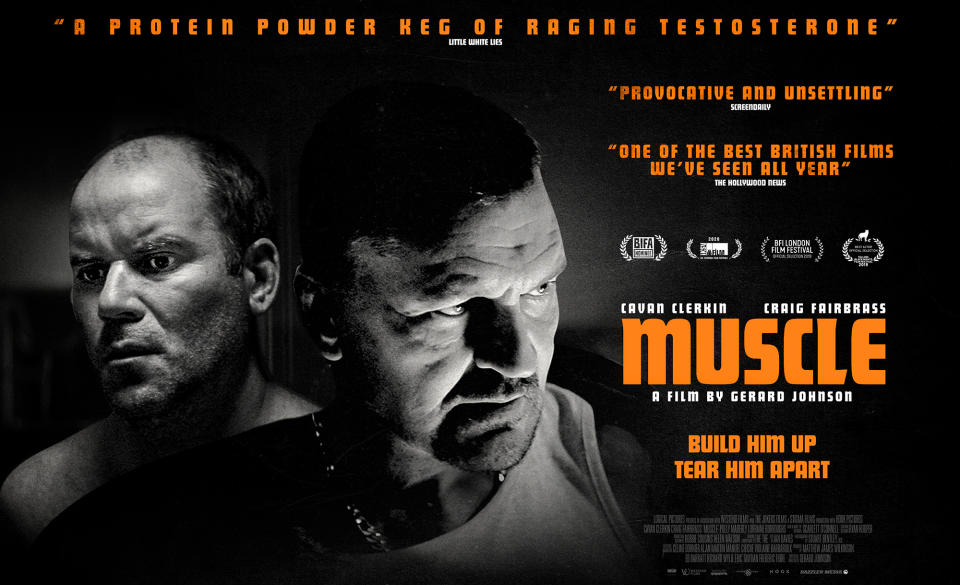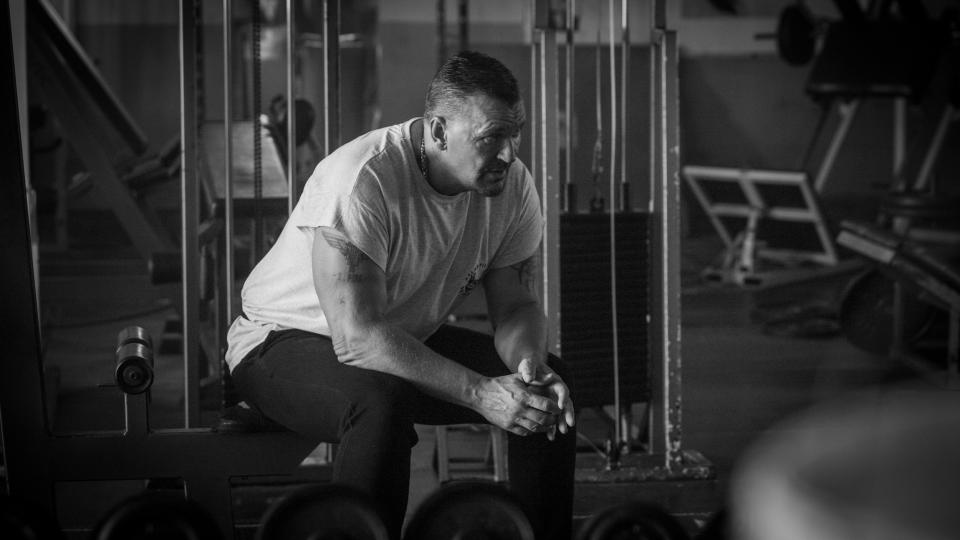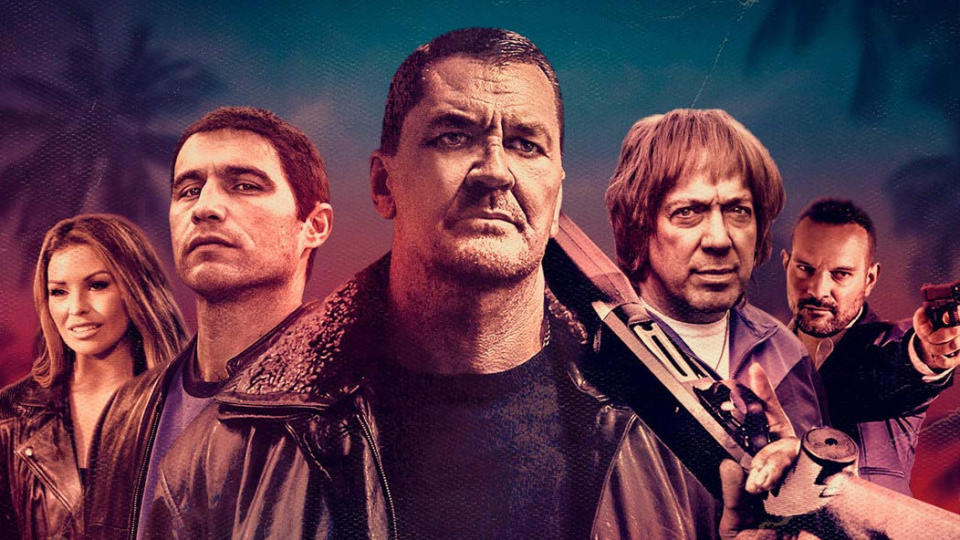Craig Fairbrass on 'Muscle': 'I got good reviews after 30 years of being slaughtered' (exclusive)
Watch: Trailer for Muscle, starring Craig Fairbrass and Cavan Clerkin
Craig Fairbrass is finally getting some love from the notoriously snooty world of film criticism — and he’s loving it.
Two decades after he was the prime suspect in the famous “Who Shot Phil?” EastEnders mystery and after many years of playing lairy blokes on DVD covers which invariably feature either a Union Jack, a gun or often both, the 56-year-old Londoner is doing something very different indeed.
“The consensus among most of the people I have spoken to has been that everybody, regardless of background or what they do or whether they’re male or female, has really enjoyed the film,” Fairbrass tells Yahoo Movies UK.
“I think it’s just because it’s different. It’s quite an unusual, unique film.”
Read more: John Lithgow admits he was bad alongside Fairbrass in Cliffhanger
The film in question is writer-director Gerard Johnson’s stylish, monochrome thriller Muscle. Set in the world of men’s fitness and orbiting around a sweaty, grubby gym in the North East, it has many of the constituent parts of a traditional Fairbrass flick — but it feels very different indeed.
Fairbrass plays personal trainer Terry, who inveigles himself into the life of chubby call centre worker Simon — portrayed by sitcom stalwart Cavan Clerkin in a role that is both literally and metaphorically transformative.
It’s a compelling movie that — along with recent crime thriller Villain — marks a real turn in Fairbrass’s career, which has previously been dominated by the Rise of the Footsoldier franchise.
Read more: Beloved movies hated by critics
He adds: “Back to back with Muscle and Villain, it changed things. I started getting good reviews after 30 years of being slaughtered.
“You have to rub your eyes and go ‘is this actually real?’, but it has been lovely.”

One of the strangest moments in Muscle sees a late-night revel organised by Terry turn into a drink and drug-fuelled swingers’ party in which some of the actors engage in unsimulated sexual acts.
Fairbrass says it was “surreal” to act around people who were having sex, but that everyone involved was “professional and well-behaved”.
Read more: UK film body issues sex scene guidelines
He adds: “We got there early in the morning and f***ing shot late into the night. There were people having sex there and it was just a proper swingers’ party.
“Everyone was drinking because you had to — there was no way you could turn up and have a bacon sandwich and a cup of tea. It needed to be authentic and Gerard is very much into the real.”
This is certainly Fairbrass as you’ve never seen him before.
Read the full interview with Craig Fairbrass, in which he discusses the way Muscle critiques masculinity and where he will take his career next...
Yahoo Movies UK: With lockdown easing, Muscle can now be seen in some cinemas. How excited are you about that?
Craig Fairbrass: Very lucky. Obviously, we’ve had to lose a few because some of the locations it was going to be screening at are in tier three. It’s just one of those things. But the positive side is that we’re very lucky to have some screens in London and the surrounding areas. We quite easily could all have been in tier three, so it’s good.
I really thought it was a fascinating film. I very much enjoyed it.
That’s good to hear. The consensus among most of the people I have spoken to has been that everybody, regardless of background or what they do or whether they’re male or female, has really enjoyed the film. I think it’s just because it’s different. It’s quite an unusual, unique film.
We talk about British films a lot and the stereotype is that they’re either period dramas or East End gangster movies — which obviously we’ll talk about — or they’re Ken Loach. This is very different to all three of those things.
Exactly, although I’d kill to work with Ken Loach, I’ve got to say.
I remember watching Muscle for the first time and thinking to myself that it’s just so different. Everything about it is unusual. It’s a weird story and it’s a slow-burner. I’ve always watched those unusual, arthouse films that just pull you in with a fascinating story.
We’re on the phone and you can’t see me but, if you could, you’d know I don’t know anything about gyms and gym culture...
That’s not necessarily a bad thing!
Well that’s what I wanted to ask. The portrayal of that particular culture and that specific kind of masculinity is so prominent in this film. How significant was that for you?
I started going to gyms when I was 15. When I started training, you had to go on a bus for an hour to get to a gym, but now they’re everywhere. Everybody knows about fitness and what to eat and what not to eat. It’s common knowledge and you’ve got all of these big complexes — these shiny, corporate places — that are owned by giant companies. In LA, they’re on every corner and they’re all open for 24 hours.
But where Muscle is rooted in is in the spit and sawdust of those gyms which are unusual to find. They’re the old gyms. Gerard looked at quite a lot of gyms, but he was looking for something very specific — and he found it. The windows in this place are welded shut. There’s lightbulbs missing. There’s old, iron equipment in that gym that has been there for about a hundred years — and I’m not exaggerating.
It’s got a membership of these guys, and it’s their life. They train every day. It’s an escape. The guys who worked there were amazing, lovely human beings. They were fantastic and went out of there way to help us and make it look authentic. The backdrop of that style of gym is the essence of the film.
It does feel really authentic. Obviously, Cavan’s character is very much a fish out of water in that world, whereas yours fits it like a glove. The two of you have amazing chemistry. How did you go about building that?
We were very lucky. We did a lot of rehearsals and reading and improv and getting to know each other. But from the first couple of scenes we read together, I knew in my heart that there was a little bit of magic there. Cavan is an amazing actor. I can put my hand on my heart and say that he’s one of the best actors I have ever worked with.
He’s very intuitive and instinctive. He’s on it. And he has a beautiful quality about him. That innocence is there in the early stuff and you can see the metamorphosis of him changing, physically and his personality. I think that as an actor, you’re only as good as the person you’re working opposite. When you’re working with good people, it rubs off on you. We just gelled beautifully. We dovetailed.
When I watch the scenes back, I think the dynamic between us works because we’re so different in every aspect and everything about us. It just works. Sometimes it works and sometimes it doesn’t, but on this occasion we were very lucky. And a great script too.

It feels obvious to say it, but this is a very different sort of role for you. It feels like you’re in the mix of a quite conscious career shift. What drove that for you?
Gerard. Being given the opportunity. It’s not an easy business and we’re all sort of pigeon-holed and slotted into certain places. Even with the Footsoldier films, I won Best Actor in the public vote at the National Film Awards [in 2018 for prequel Rise of the Footsoldier 3: The Pat Tate Years]. Even with that, I tried to make it as real and terrifying as possible. And it works.
Gerard saw me in those films and said: “I’ve always thought you were very underrated and I think there’s more to you than you’re doing.” I said that I was in this trap and the only way I can get out of it is to be given an opportunity — a vehicle to show what I can actually do with an emotional range. He said: “This is why I’ve met you. I want you to play the role of Terry.” When I read the script, it just blew me away and I said I’d kill to play this part if you let me show you what I can do. Lucky enough, it worked out.
That then led on to another film I’ve done called Villain. It’s a crime thriller, but it’s very highbrow and arty. I look at it as an arthouse crime film. It’s got incredible reviews. Back to back with Muscle and Villain, it changed things. I started getting good reviews after 30 years of being slaughtered. You have to rub your eyes and go “is this actually real?” but it has been lovely.
It’s interesting you mention winning a public vote for the Footsoldier films. Do you worry about fans who’ve loved you for years watching something like Muscle and going “what’s Fairbrass doing in this arthouse, black and white movie”?

I don’t do a lot of social media, but I’m on Twitter and I get a lot of messages. I try to engage with as many people as I possibly can. What I’ve found is that everybody appreciates a quality film, regardless of what it is. If you’re into movies and you’re into a certain actor, then as long as they’re good and believable in that role, you’re going to actually gain people. They appreciate that you’re good at what you do. I genuinely feel that.
There’s elements of Terry where he still has that side to him, but he’s a very complex individual with many layers to him. He’s not one-dimensional. I hope people will engage with the character and enjoy the film because I’m always going to be flipping backwards and forwards. I’m just trying to stick with the quality. If I do a crime film, it’s got to be on the level of Villain.
I’ve just done another film called Ire, with me and Stephen Odubola from Blue Story. It’s a beautiful script. It’s a heavy duty, violent prison film, but it’s the human story at its heart. It’s just proper, quality material.
I think with Muscle, in particular, it’s about exploring ideas of masculinity. That’s fascinating given the films that have made your name, to be doing something which really questions traditional masculinity.
And really, deep down he’s the least masculine person of anyone in the film. It’s a facade. It’s body armour that he wears, but deep down he’s such a f***ing f***ed-up individual. The physicality never bothered me about the film. I just wanted to get inside the geezer’s head to make him believable and to show the little gear changes and nuances of his personality.
I’m really proud of the film. I could talk about it all day long. I feel lucky and fortunate to be involved in, finally, a quality piece where I can show my chops as an actor.
I have to briefly ask about the swingers’ party/orgy scene. What is it like to be asking amongst all of that?
It was strange. Surreal is the word, I suppose. We had two days in this house with the windows blacked out, so you never knew whether it was day or night. The first party was to get Simon into the parties, then the next one was the swingers’ party.
We got there early in the morning and f***ing shot late into the night. There were people having sex there and it was just a proper swingers’ party. Everyone was drinking because you had to — there was no way you could turn up and have a bacon sandwich and a cup of tea. It needed to be authentic and Gerard is very much into the real.
We had two cameras. It was very professionally orchestrated. Everybody was very well-behaved. You had the people who were fully out for it and then the people watching. It was, especially the next day, a strange and sticky place. But it works in the movie.

I think it does. It really shows how far Terry has taken Simon into a different world.
There are loads of scenes in the film that never made the cut. It was about another half an hour longer, but it’s a long film anyway. I think the length of it works because it needs time to breathe. Every time I watch it, I notice new, little things. And sometimes it makes me laugh.
What’s next for you? It would be easy to write this narrative as you rejecting your previous work and doing different things, but I don’t think that’s necessarily what it is, so I wanted to ask where you’re going next?
As I said, I’ve just finished Ire about four weeks ago. We shot that in lockdown. It’s another heavy duty drama. But who knows? At the end of the day, I’m an actor and I’m a puppet. I’m trying to be more careful. I’m meeting new agents and I’m trying to take a route now where I can try my hardest to stick with quality. You just want to keep that.
Obviously I’ve just dipped back into Footsoldier [for fifth instalment and reboot Rise of the Footsoldier: Origins] because the people have been very good to me on those films. I’ve only done a week on the last one.
But you never know. I could put the phone down to you and get a call. I’ve had a couple of calls from the US off the back of Villain because it did so well there. It was a critic’s choice in the New York Times and number seven on the iTunes chart in the US. So who knows?
Maybe it will be that call from Ken Loach?
You never know! Fingers crossed!
Muscle is in cinemas and on video on demand from 4 December.
Watch: Trailer for Villain

 Yahoo Movies
Yahoo Movies 
